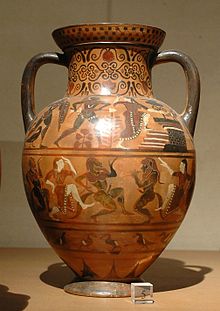amphora
See also: âmphora
English

Etymology
From Latin amphora, from Ancient Greek ἀμφορεύς (amphoreús, “vase-shaped ornament with a narrow neck”).
Pronunciation
Noun
amphora (plural amphorae or amphoras)
- A two-handled jar with a narrow neck that was used in ancient times to store or carry wine or oil.
- One of various units for measuring liquid or volume during the Roman Empire, measuring between 18.5 and 39 litres depending on the variant.
Derived terms
Translations
type of jar
|
See also
Anagrams
Latin
Etymology
Borrowed from Ancient Greek ἀμφορεύς (amphoreús, “vased shaped ornament with a narrow neck, literally two-handled pitcher”).
Pronunciation
- (Classical Latin) IPA(key): /ˈam.pʰo.ra/, [ˈämpʰɔrä]
- (modern Italianate Ecclesiastical) IPA(key): /ˈam.fo.ra/, [ˈämforä]
Noun
amphora f (genitive amphorae); first declension
- A vessel, usually made of clay, with two handles or ears for liquids; amphora; flagon, pitcher, flask, bottle, jar.
- A measure for liquids; quadrantal; the measure of a ship.
Declension
The genitive plural amphorārum has the alternative form amphorum which is especially used in the sense of a measure.
First-declension noun.
| Case | Singular | Plural |
|---|---|---|
| Nominative | amphora | amphorae |
| Genitive | amphorae | amphorum amphorārum |
| Dative | amphorae | amphorīs |
| Accusative | amphoram | amphorās |
| Ablative | amphorā | amphorīs |
| Vocative | amphora | amphorae |
Derived terms
Descendants
- Catalan: àmfora
- French: amphore
- Galician: ánfora
- Italian: anfora
- Portuguese: ânfora
- Spanish: ánfora
- → English: amphor
- → German: Amphore
- →? Proto-Germanic: *ambrijaz (see there for further descendants)
References
- “amphora”, in Charlton T. Lewis and Charles Short (1879) A Latin Dictionary, Oxford: Clarendon Press
- “amphora”, in Charlton T. Lewis (1891) An Elementary Latin Dictionary, New York: Harper & Brothers
- amphora in Charles du Fresne du Cange’s Glossarium Mediæ et Infimæ Latinitatis (augmented edition with additions by D. P. Carpenterius, Adelungius and others, edited by Léopold Favre, 1883–1887)
- amphora in Gaffiot, Félix (1934) Dictionnaire illustré latin-français, Hachette.
- “amphora”, in The Perseus Project (1999) Perseus Encyclopedia[1]
- “amphora”, in Harry Thurston Peck, editor (1898), Harper's Dictionary of Classical Antiquities, New York: Harper & Brothers
- “amphora”, in William Smith et al., editor (1890), A Dictionary of Greek and Roman Antiquities, London: William Wayte. G. E. Marindin
Categories:
- English terms borrowed from Latin
- English terms derived from Latin
- English terms derived from Ancient Greek
- English 3-syllable words
- English terms with IPA pronunciation
- English lemmas
- English nouns
- English countable nouns
- English nouns with irregular plurals
- en:Vessels
- Latin terms borrowed from Ancient Greek
- Latin terms derived from Ancient Greek
- Latin 3-syllable words
- Latin terms with IPA pronunciation
- Latin lemmas
- Latin nouns
- Latin first declension nouns
- Latin feminine nouns in the first declension
- Latin feminine nouns
- la:Vessels
